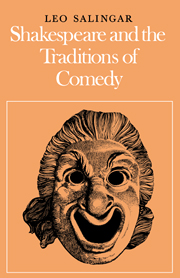1 - The unfaithful mirror
Published online by Cambridge University Press: 04 December 2009
Summary
‘O Muse, banish wars and dance with me, your friend, celebrating the weddings of the gods, the banquets of men, and the festivals of the blessed’ – for these are the themes that have always been your care.
AristophanesComedy is a game played to throw reflections upon social life, and it deals with human nature in the drawing-room of civilised men and women.
MeredithComedy has usually meant one thing in theory and another in practice. In the mainstream of critical theory the prime task allotted to it has been the representation of typical characters and probable incidents from common life; according to the definition attributed to Cicero, which renaissance humanists and their successors never tired of repeating, it was ‘the imitation of life, the mirror of custom, the image of truth’. This definition can be taken in two senses, as a mirror can be used either to reflect one's appearance or to correct it; but in its most direct sense the definition simply ignores or even contradicts the evidence that many of the plays it refers to are fantastic or remote from ordinary life and that most, if not all, of them contain situations that strain probability. And, for similar reasons, the argument that a comedy is essentially an instrument for moral correction remains, on the face of it, special pleading or else a pious aspiration. The interpretation of Shakespeare's comedies, in particular, has suffered from the discrepancy between critical theory and the practice of his art.
- Type
- Chapter
- Information
- Shakespeare and the Traditions of Comedy , pp. 1 - 27Publisher: Cambridge University PressPrint publication year: 1974



